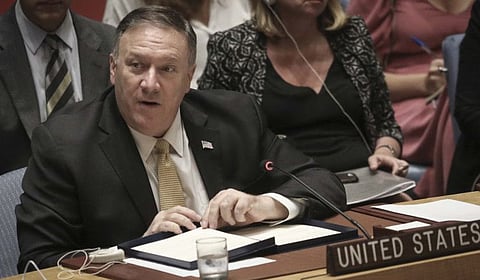Iran strategy is working but more pressure needed, says Pompeo
US Secretary of State warns Iranian tanker over delivering oil to Syria

Washington: US Secretary of State Mike Pompeo, in a television interview Tuesday said he believed the administration was finding success with the intensified sanctions against Iran that were set in motion after Trump repudiated the 2015 nuclear agreement with that country.
“We’ve put in place a set of sanctions that have denied the Iranian regime wealth,” Pompeo said in the interview, on “CBS This Morning.”
In the administration’s view, he said, “that is working.”
“Failing to confront the Iranian regime’s malign activities will only grow the regime’s multicontinental body count,” Pompeo told reporters outside the Security Council.
In prepared remarks before the council, he accused Iran’s top leader, Ayatollah Ali Khamenei, of having “gone all-in on a campaign of extortion diplomacy” to frustrate the administration’s intention to bring all Iranian oil purchases to zero.
Among the examples he cited were the Iranian seizures of foreign-flagged oil tankers traversing the Strait of Hormuz last month.
Later on Tuesday, Pompeo addressed the U.N. Security Council saying that greater cooperation and “fresh thinking to solve old problems” are needed in the Middle East - but he also condemned Iran and its proxies for continuing “to foment terror and unrest” in the region.
Call to keep up pressure on Iran
America’s top diplomat said “time is running short” to keep a U.N. arms embargo on Iran and a travel ban on the head of the country’s elite Quds Force, Qasem Soleimani, warning that ending such sanctions will “create new turmoil” by the country’s “terror regime.”
The embargo and ban expire in October 2020.
“Failing to confront the Iranian regime’s malign activities will only grow the regime’s multi-continental body count spanning the last 40 years,” he warned.
Pompeo was one of more than 30 speakers at a Security Council meeting about the complex challenges confronting the Middle East. He faced sharp criticism from Russia and Iran, and milder criticism over Trump administration policies from several Western allies.
Pompeo began by touting the Trump administration’s accomplishments related to “reviving America’s leadership role” in the region.
These included helping to dismantle Daesh’s “physical caliphate” which once spanned large areas in Iraq and Syria, helping the U.N. envoy bring peace to Yemen, and facilitating new links between Israel and its Arab neighbors.
Pompeo then called for more to be done to tackle the challenges facing the Middle East from raging conflict in Libya and continuing violence in Syria to the rift among Gulf countries and Iran, which he described as “the greatest ongoing threat to peace and security in the region.”
He condemned Iran’s support for proxies in Iraq, Lebanon, Syria and Yemen as well as its “inexcusable and unprovoked sabotage and seizure of commercial vessels” in the Arabian Gulf and its development and testing of advanced ballistic missiles in defiance of a U.N. resolution.
“Clearly, from Aleppo to Aden, from Tripoli to Tehran, greater cooperation in the Middle East is needed more than ever,” Pompeo said. “We need fresh thinking to solve old problems.”
US warns Iranian oil tanker
Meanwhile, Pompeo warned that the United States will take every action it can to prevent an Iranian tanker sailing in the Mediterranean from delivering oil to Syria in contravention of U.S. sanctions.
Greece said earlier in the day that it had not had a request from the Adrian Darya 1, the vessel at the centre of a dispute between Iran and the United States, to dock at one of its ports, as Washington warned Greece against helping the vessel.
The tanker, formerly called Grace 1, left Gibraltar on Sunday. Ship-tracking data on Tuesday showed the vessel was heading toward the Greek port of Kalamata on the southern coast of the Peloponnese and was scheduled to arrive next Monday.
“We have made clear that anyone who touches it, anyone who supports it, anyone who allows a ship to dock is at risk of receiving sanctions from the United States,” Pompeo told reporters at the United Nations.
“If that ship again heads to Syria, we will take every action we can consistent with those sanctions to prevent that.”
He said that if the tanker’s oil was sold, the revenue would be used by elite units of Iran’s Revolutionary Guards. “We want to deny them the resources to continue their horrific terror campaign,” Pompeo said.
The tanker is carrying about 2 million barrels of oil.
The fate of the Adrian Darya 1 could also have a bearing on that of a British-flagged tanker seized by Iran in the Strait of Hormuz leading into the Gulf two weeks after British Royal Marine commandos seized what was then known as the Grace 1.
Speculation has mounted that the Stena Impero could be freed once the Adrian Darya 1 had set sail, although Iranian officials have denied any link between the two cases.



